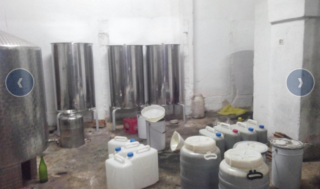More than $40 million worth of potentially dangerous food and drink has been seized in an operation coordinated by Europol and Interpol.
Operation Opson IX dismantled 19 organized crime groups and led to the arrest of 407 people worldwide. About 12,000 tons of illegal and harmful products were confiscated but results were at least partially affected by the Coronavirus pandemic.
In Bulgaria, an investigation by police and the food safety agency into an unregistered warehouse found seven samples of cheese which tested positive for E. coli. Some 3.6 tons of unsafe dairy products set to be processed into melted cheese were destroyed.
As part of a focus on dairy, 320 tons of smuggled or substandard items were seized by Bulgaria, Italy, France, Greece, Portugal and Switzerland. This included rotten milk and cheese which posed a threat to public health.
Police, customs, national food authorities and private sector partners in 77 countries took part in the annual action which ran from December 2019 through June 2020. In Operation Opson 2019, more than $117 million worth of potentially dangerous food and drinks was seized including 16,000 tons and 33 million liters of fake food and drink.
Horse meat back in focus
At more than 5,000 tons, animal food was the most seized product in 2020, followed by alcoholic beverages with more than 2,000 tons, cereals, grains and derived products, coffee and tea and condiments.
 Large amounts of saffron were detained: 90-kilograms in Spain and 7 kg in Belgium with an estimated value of more than €306,000. US authorities seized 147 kg of raw apricot kernel seeds sold as a cure for cancer.
Large amounts of saffron were detained: 90-kilograms in Spain and 7 kg in Belgium with an estimated value of more than €306,000. US authorities seized 147 kg of raw apricot kernel seeds sold as a cure for cancer.
“In times of crises, criminals always look for new ways to abuse consumers and increase their illegal profit to the harm of public safety. Counterfeit and substandard food is not only deceitful to consumers but can also pose a significant threat to their health,” said Catherine De Bolle, Europol’s executive director.
Europol launched a project to support national authorities combat sales of illegal horse meat, led by Belgium, Ireland and the Netherlands and supported by DG SANTE, Denmark, France, Italy, Spain and the United Kingdom.
A trend in Europe was falsification of horse passports. In one case, horses transported into Italy using fake documents claiming they were to take part in sports competitions were actually sent to a slaughterhouse.
Activities focused on document checks of more than 157,000 horses from eight countries and about 117 tons of horse meat. Live animals and more than 17 tons of meat were seized from sites in Belgium, Ireland, Italy, Spain and the Netherlands. Inspections of slaughterhouses in several countries showed that about 20 percent of foreign passports used for these horses had signs of forgery.
Coronavirus pandemic impact
Another trend was low-quality products in the supply chain, a development possibly linked to the COVID-19 pandemic, according to the police agencies.
 Authorities discovered thousands of fake medical products, including disinfectants and 17,000 false COVID-19 testing kits. A shipment of seafood seized in South Africa originating from Asia was falsely declared as personal protective equipment.
Authorities discovered thousands of fake medical products, including disinfectants and 17,000 false COVID-19 testing kits. A shipment of seafood seized in South Africa originating from Asia was falsely declared as personal protective equipment.
Seizures of expired food items or where dates had been altered were significantly higher than previous Opson operations. Interpol said this could be criminals capitalizing on the disruption of food supply chains caused by national lockdowns.
Jürgen Stock, Interpol secretary general, said as countries continue efforts to contain COVID-19, criminal networks distributing potentially dangerous products show only determination to make a profit.
“The scale and variety of food and drink seized during this operation serves as a reminder for members of the public to be vigilant about what they buy, and the need for continued vigilance and action by law enforcement.”
Illicit alcohol and olive oil
Operation Opson was also supported by the European Anti-Fraud Office (OLAF), European Commission and European Union Intellectual Property Office (EUIPO).
More than $20 million worth and 1.2 million liters of illicit alcoholic beverages, mostly wine, were taken out of circulation, including 5,000 liters of vodka smuggled in a trailer in Norway thanks to law enforcement agencies, coordinated by OLAF.
A total of 149 tons of cooking oil was seized as a result of action led by Greece. About 88 tons was olive oil reported by Albania, Croatia, France, Greece, Italy, Jordan, Lithuania, Portugal and Spain. In Italy, inspectors found a surplus of product, which was not registered in official documents of the company producing olive oil, so more than 66 tons of the product was seized.
Anne Bucher, director general of DG SANTE, said the operation helps to protect consumers and honest food businesses in Europe.
“The EU Food Fraud Network complements effectively the work of the enforcement authorities and the justice system in the EU and thus making a real difference in the fight against food fraud. The Commission will, as announced in the Farm to Fork strategy, continuously invest in the fight of food fraud and is stepping up the tools to fight against these practices. We aim to make the food market more sustainable and resilient against fraud.”
(To sign up for a free subscription to Food Safety News, click here.)
"drink" - Google News
July 23, 2020 at 11:09AM
https://ift.tt/32LDh2Q
Food and drink worth $40 million seized in Operation Opson - Food Safety News
"drink" - Google News
https://ift.tt/2STbaKe
https://ift.tt/2VWmZ3q
Bagikan Berita Ini














0 Response to "Food and drink worth $40 million seized in Operation Opson - Food Safety News"
Post a Comment